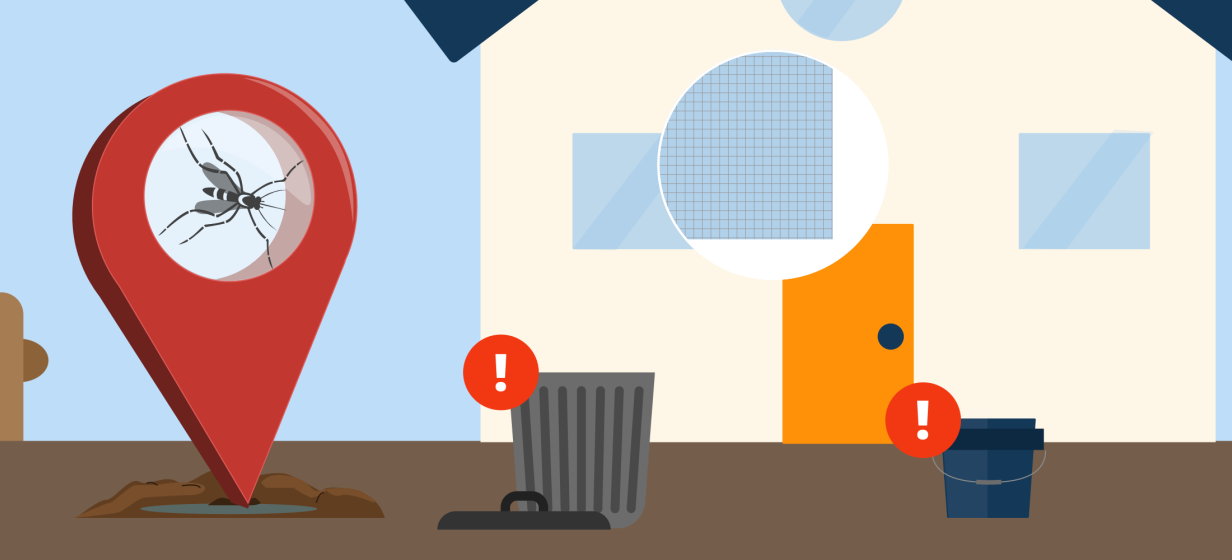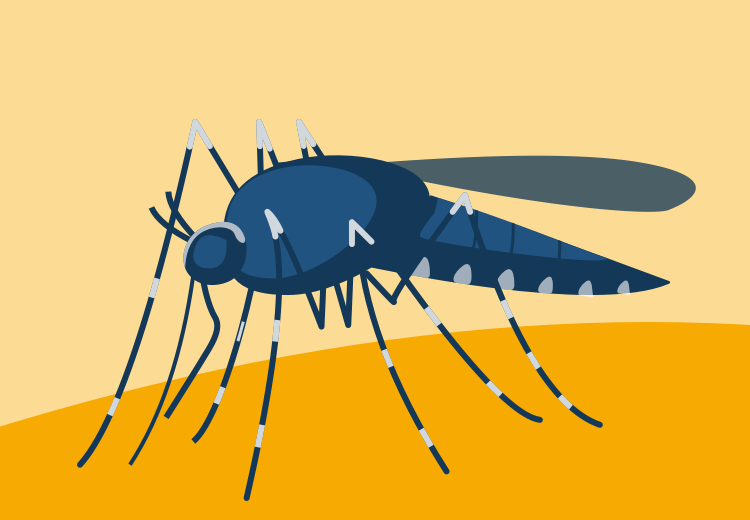Find out how you can become the ultimate Mosquito Hero

Intelligence:
Over many years, mosquitoes have developed special abilities to track down and bite humans.1,2,5 Because of these abilities, they have contributed to a very significant number of human deaths over the years; mosquito-borne diseases, such as dengue, malaria and yellow fever, cause over 700,000 deaths per year around the world.3,4,6 However, there are ways we can help protect ourselves and our community.
Here are some ways that you can become a Mosquito Hero.
Know your environment
Intelligence:
Mosquitoes like to lay their eggs in standing water, even more so if the water is in a man-made container. They stick their eggs like glue to the walls of these containers, which won’t fall off unless they are scrubbed. The eggs are hardy; they can survive even if the water dries out for up to 8 months. Then if it rains and they are recovered by water, they hatch and grow into adults in around 1 week.7
Mosquitoes also tend to gather in ‘hotspots’ or ‘dengue danger zones’. These can be public areas or those neglected by the community, where water containers can build up without being thrown away.8,9,10
Three notable examples of these areas include:
- Construction sites9
- Public parks10
- Abandoned buildings8
Your mission:
Keep mosquitoes from laying eggs inside and outside of your home.
Every week, you should empty out, scrub, cover or throw out all your containers that hold water:7
- Vases
- Pet water bowls
- Flowerpot saucers
- Old tires
- Buckets
- Trash cans
- Rain barrels
If water must be stored, tightly cover storage containers to prevent mosquitoes from getting inside and laying eggs.7
Avoid dengue danger zones such as parks, construction sites and abandoned buildings. If you plan to go to one of these ‘hotspots’, take care and protect yourself.8,9,10
Top tip:
Community participation is key to limiting mosquito breeding grounds. If every household in your area can be filled with Mosquito Heroes, the community could take a significant step towards fighting mosquito-borne infections.11
Defend your base
Intelligence:
You can set up your home base to help protect yourself from these mosquito invaders.
Nets: A mosquito net creates a physical barrier between you and the mosquitoes when you are sleeping or resting. These can be used both indoors and outdoors, and can be made more effective by treating them with insecticide.6
Screens: Mesh screens on windows and doors can also help prevent mosquitoes from entering your home.6
Air conditioning: Mosquitoes are unlikely to enter rooms where air conditioning is used constantly. However, windows and doors must be kept closed for the air conditioning to work properly.6
Insecticide products: Plug-in insecticide products use electricity to slowly release insecticide into your home. Although they do not provide protection from bites alone, they can be used alongside nets and screens to discourage mosquitoes. Outside your home, insect-repelling candles, methylated burners, cones and coils can be used, but these are not recommended for indoor use.6
Your mission:
Set up your home to prevent the mosquito invaders entering:6
- Set up mosquito nets, screens, air conditioning and appropriate insecticide products if available
- Check for any holes in your nets and screens before using them
- Make sure any holes present are mended, for example using a needle and thread
- Keep screens closed at all times to avoid mosquitoes coming into the room
- Tuck the net under your mattress during the night. Either collapse it down, or keep it tucked up during the day to stop mosquitos flying under and into the net
- Make sure there is enough space so that your skin does not rest against the net, as mosquitoes may still be able to bite through it
- Use air conditioning when possible
Top tip:
Mosquitoes will try to avoid insecticide, therefore a mosquito net treated with insecticide might bring an additional layer of protection. Some nets can also be retreated; follow the manufacturer's instructions when washing or retreating bed nets with insecticides.6

Prepare your armour
Intelligence:
Clothing: Any part of your body that is not covered by loose clothing is a potential target for mosquitoes, but the right clothing can make it much harder for mosquitos to reach your skin. Mosquitoes bite us using their proboscis, a specially adapted mouth part which is well equipped for piercing our skin and sucking our blood.5 It can reach through tightly-fitted clothing, but cannot bite through loose clothing. Any part of your body that is not covered by loose clothing should have insect repellent applied.6
Insecticide: For added protection, clothing can be treated with insecticide, such as Permethrin, which can kill mosquitoes when they land on the fabric.6
Your mission:
In areas with mosquitoes, always wear loose-fitting clothing with:6
- A high neckline
- Long sleeves
- Long trouser legs, or long skirt/dress
- Socks
For added protection, use clothing already pre-treated with insecticides, or follow manufacturer's instructions to treat your own clothing. Also note that the effectiveness of insecticide-treated clothing can decrease with frequent washing.6
Top tip:
In hot climates, your clothing can be thin, as long as it is loose. Remember, different types of mosquito feed at different times of the day, both indoors and outdoors. Therefore you should take precautions to avoid being bitten at all times of day and night.6
Weapons at the ready
Intelligence:
Insect repellents: Insect repellents will not kill mosquitoes, but should discourage them landing on your skin. Repellent are available in different strengths (concentrations), in general, the higher the strength, the longer the repellent should protect you from being bitten before you need to reapply it. When applied to the skin properly they should provide several hours of protection, but you should always check the exact instructions on the bottle for how often to apply.6
DEET is the most effective repellent weapon we have at our disposal. It blocks mosquitoes key human-hunting senses: smell, taste and touch, To mosquitoes, DEET covered skin smells strange, feels nasty and tastes bitter. 12
Your mission:
When in areas with mosquitoes, it is recommended to apply insect repellent to all areas of exposed skin not covered by clothing:6
- Apply after sunscreen (be aware that the SPF protection of your sunscreen may be reduced)
- Reapply frequently in line with instructions, especially if you notice mosquitoes flying close to your skin
- Reapply after swimming, washing or excessive sweating
- Apply carefully around the face and eyes. Be careful not to breathe in the repellent – if using a spray, spray it onto your hands and then rub onto your face
- Keep away from synthetic clothes or plastics as it may damage them, for example credit cards, phones, watches or glasses
Top tip:
In addition to DEET (diethyltoluamide), it has been reported that some of the most effective repellents contained the following active ingredients: Icaradin (Picardin), Lemon Eucalyptus (PMD), IR3535.6
Methods which do not tend to provide consistent protection against mosquitoes include: tea tree oil, Vitamin B1 and Vitamin B12 tablets, eating garlic or yeast extracts, using bath oils and skin softeners, drinking alcohol, using electronic buzzers or mobile phone apps that emit high frequency soundwaves.6
Congratulations
Now you have the knowledge to help you join the fight against the mosquito threat. You have graduated as a Mosquito Hero.
Be vigilant, take precautions, and help protect your community against this potentially deadly foe.
If you are worried about dengue or have healthcare-related questions, please contact your doctor or other healthcare professional promptly.
Want to learn more?
If you want to learn more about this potentially deadly foe, read our next article: Just one bite: The risk of dengue in an endemic area: Just one bite: The risk of dengue in an endemic area































